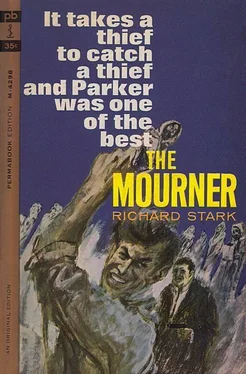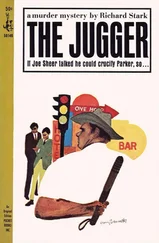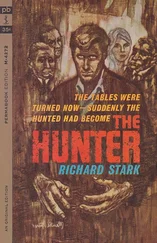It was time to be going. According to the getaway theory explained to him by McKay, now was the time to get started.
He showered, calm and relaxed, taking his time. He dressed in fresh clothing from the skin out, packed his suitcase, gathered up the other suitcase, with all the money in it, and tiptoed out of the motel room.
The Pontiac was there, waiting. He stowed both suitcases on the back seat, got behind the wheel, and took the road map from the glove compartment.
He wanted to travel south from here, but he was north of the city. Northeast. Was there any way to skirt the city to the east? He studied the unfamiliar map, following thin lines of roads with the tip of one stubby finger, and finally found a way to get over to the Capital Beltway. That would take him south into Virginia, where he could pick up a route numbered 350 which would take him to a route numbered 1, which ran all the way down the coast to Miami.
He laid the map on the seat beside him, and started the engine. He was not used to so large and soft an automobile, and he drove cautiously at first, barely touching the accelerator as he brought the car up the slope to the street. He underestimated and made far too wide a right turn, but Wisconsin Avenue at this point was four lanes wide, and at this hour in the morning there was no other car in sight anyway.
His progress at first was agonizingly slow. The automobile was unfamiliar to him, as were the street signs. The standard pictographic signs common throughout Europe were not used here. Instead of the usual white background and red frame and black pictorial silhouette, there were dull yellow diamonds, some bearing words and some deformed arrows. Stop signs were red octagons with the word STOP in white, unless they were yellow octagons with the word STOP in black. It was confusing, and a little frightening. He couldn’t afford to have an accident now, not with one hundred thousand dollars in a suitcase on the back seat.
By the time he finally got to the Capital Beltway he was perspiring freely, despite the November chill, and there was a pain in his head from creasing his brow and squinting through the windshield.
But the Capital Beltway was a superhighway, like the German Autobahn. Menlo relaxed at once, sat back more comfortably, held the steering wheel less tightly. He also pressed more firmly on the accelerator. The car, bulky and soft as a heavyweight boxer out of condition, was nevertheless an eager sprinter. The car roared down the empty highway, as dawn slowly spread over the sky to his left. He was on his way.
He didn’t hear the siren at first. He was trying to decide whether or not to stop in this little town for something to eat, and though the wailing filled his ears, at first he didn’t connect it with himself at all.
He was just across the border between North and South Carolina, and it was one o’clock in the afternoon. He had been driving steadily for eight hours. This automobile was the most comfortable he’d ever driven, but eight hours’ driving in any car has to be tiring. All the way across North Carolina he’d been telling himself to stop, but the desire to increase the distance between himself and Washington had up till now been stronger than his need for food and rest. He had stopped only once, to fill the automobile’s gas tank and empty his bladder. That had been over three hours ago.
It seemed like a pleasant little town, this one, small and somnolent. Except for the sunshine and the warmth, it could be a sleepy valley town in Klastrava. Sunshine and warmth. He had never in his life till now had enough sunshine and warmth. Klastrava was a mountainous country, in the heart of the Carpathians, and in mountainous lands the human settlements are always in the valleys. In mountainous lands the rain falls always in the valleys and mists and fogs lay there always. The summers are hazy, humid, muggy, the winters heavy with bronchial dampness.
Sunshine and warmth. And beautiful women. And one hundred thousand dollars.
He was far enough away now from Washington. It was safe to stop in this little town. Ahead on the right, a sign hung out from a building that looked like a railroad car. It read diner. He had decided to stop here, and that was when he heard the siren.
He looked in his rearview mirror. The road was straight all the way through the little town, and almost empty. Behind him, two blocks away and coming on fast, was an automobile with a revolving red light on top.
Police.
He thought they’d caught up with him. He thought for one panic-stricken instant, that somehow they had traced him. The police authorities had learned about the robbery and the killings, and they had traced him in some inexplicable fashion. They had caught up with him.
The problem was, he didn’t have the background to understand what was happening. In all of Klastrava there isn’t one single solitary speed trap. There isn’t enough tourism to support one.
He thought: Run? Outrace him?
No good. The police car would be even faster than the one Menlo was driving. Besides, his reading of crime fiction had told him what to expect ahead. Roadblocks. Parker and McKay had talked about roadblocks too, so they were not entirely fictional. In his own work, at home, he had occasionally found the need to order roadblocks set up and trains searched, even the borders closed.
Could they, in this country, close the borders between states?
The police car had caught up with him, was now beside him. An angry-looking, wrinkle-faced old man in a cowboy hat waved to him to pull over to the curb and stop.
One man? One wrinkle-faced old man? This couldn’t be connected with what had happened in Washington. They would consider him, as the wording went, armed and dangerous. They would send more than one wrinkle-faced old man to apprehend him, if they were after him for what had happened in Washington.
He obeyed the old man’s hand, and pulled to a stop at the curb, wondering what it could be all about. There might be some sort of border checkpoint where he was supposed to stop and hadn’t, or some such thing. He would have to wait and see, find out what the old man wanted. If worst came to worst, the derringer was reloaded and in his coat pocket.
The police car nosed in at an angle in front of him, its rear jutting out into the traffic lane in the approved method, to keep him from driving suddenly off as soon as the old man got out of his car. Menlo rolled down the window on his side, and waited.
The old man came back toward him, walking with an odd bowlegged rolling gait, as though it was a horse he’d just climbed down from instead of an automobile. He was wearing black boots and dark-blue breeches several sizes too large, which sported a yellow stripe up each seam. His dark-blue uniform coat looked like the jackets worn by Army officers in the First World War. A light-blue shirt, with a dark-blue tie, and a tan cowboy hat completed him. A broad black belt, studded with shiny cartridges, encircled his pudgy waist. A heavy black holster sat on his right hip.
He came over, and stood glaring in a Menlo. “You in a hurry, bud?”
Menlo blinked. Police at home were always polite and courteous on the surface, whatever happened afterward. He didn’t know what to say. He just stared at the angry old man.
The old man said, “The posted speed limit in this village, in case you was in too much of a hurry to read the sign back there at the city line, happens to be twenty miles an hour. I just clocked you at thirty-two miles per hour, on our main street. I don’t see no fire nowhere.”
Menlo understood only half of it, and that half he didn’t believe. “Twenty miles an hour?” He’d been going through cities and towns with thirty-mile-an-hour speed limits — and occasionally twenty five — all day long.
Читать дальше












